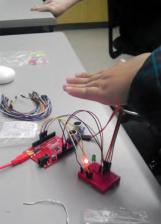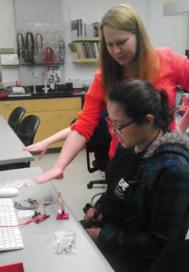Arduino Outreach
Fall
2014
Interactions - SPS Chapters in Action
Arduino Outreach
Students Hooked On Programming And Electronics
By:Hunter Mills, Kevin Zack, and Benjamin Cunningham.
Sonoma State University
Meet Luisa Jojola. Last year she was a third-year biology and mathematics double major at Sonoma State University (SSU) in Rohnert Park, California. She is also a member of the MESA Engineering Program on campus, which supports educationally disadvantaged students pursuing degrees in engineering or computer science. Luisa was one of 15 students who attended a two-day outreach workshop on electronics and programming organized by SSU’s SPS chapter and supported by an SPS Future Faces of Physics (FFP) award, with additional support from MESA.
Prior to this event, Luisa had no experience in programming or electronics. She didn’t know what to expect at the workshop; programming and electronics can be intimidating, after all. At the end of the first day, she expressed uncertainty about coming back for the second day.
The hardest step in learning any subject is knowing where to start. Mathematics students start with arithmetic and move on to algebra, geometry, trigonometry, calculus, and so on. The first step in programming is usually to get the computer to output “Hello world!” In electronics the first step is usually to create a basic circuit with a resistor and an LED. These exercises are not particularly rewarding.


Our goal was to introduce students to programming and electronics by skipping straight to the fun stuff: powering sensors and collecting data. Arduino kits made this possible.
Arduino is an open-source hardware device programmed in a language similar to C and designed to streamline microelectronic projects. It masks complex subjects such as communication protocols with simpler, user-friendly commands. Arduino is also supported by an active and open community that continually creates new educational projects and new device-specific libraries that allow information to be logged to an SD card, for instance, or gathered from a GPS unit.
Our two-day workshop started by presenting students with a range of sensors and basic projects. We asked the students to work on whatever they found most interesting. Students could also take the sensors home with them overnight.
Re-enter Luisa. She came back! She decided to take an Arduino home and found that she really enjoyed working with it. By the end of the second day, she had essentially created a backup sensor for a car. Her device included an ultrasonic range finder that found the distance to another device, and an LED she programmed to change color depending on that distance. Luisa has since decided to take an introductory course in C and C++. Not bad for someone with no background in programming or electronics! //
About Future Faces of Physics Awards
Future Faces of Physics Awards are made to SPS chapters to support projects designed to promote physics across cultures. The goal of the Future Faces of Physics program is to promote the recruitment and retention of people from groups historically underrepresented in physics. Applications are due October 15. For details visit http://spsnational.org/programs/awards/futurefaces.htm.
About Mesa
MESA (Mathematics, Engineering, Science Achievement) is an academic program that supports educationally disadvantaged students as they attain four-year degrees in science fields. MESA Centers are located on college and university campuses across California, and there are also K-12 and community college programs. For details, visit http://mesa.ucop.edu. The California program has been replicated in several other states.
